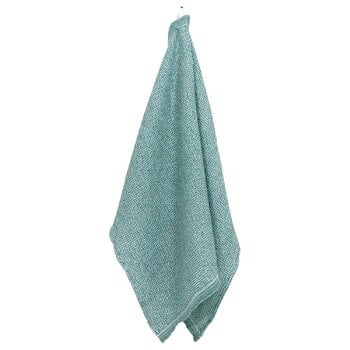The Terva small towel by Lapuan Kankurit is a stylish, practical and ecological choice for the bathroom as a face or guest towel. The small towel is made from an innovative blend of European linen, Tencel and cotton with Oeko-Tex standard. The material is lightweight, quick-drying and absorbent, and feels pleasantly soft against bare skin. The Terva collection includes towels, sauna seat covers and bathrobes in different sizes and materials, produced mainly in the own weaving mill of Lapuan Kankurit in Lapua, Finland.
Terva small towel, white - green
Lapuan Kankurit
Description
The Terva small towel by Lapuan Kankurit is a stylish, practical and ecological choice for the bathroom as a face or guest towel. The small towel is made from an innovative blend of European linen, Tencel and cotton with Oeko-Tex standard. The material is lightweight, quick-drying and absorbent, and feels pleasantly soft against bare skin. The Terva collection includes towels, sauna seat covers and bathrobes in different sizes and materials, produced mainly in the own weaving mill of Lapuan Kankurit in Lapua, Finland.
Product details (5)
- Material
- 43% tencel, 39% washed European "Masters of linen" linen, 18% cotton
- Colour
- White, green
- Length
- 50 cm
- Width
- 32 cm
- Care instructions
- Gentle wash in 60 °C
- Product ID
Reviews (2)
4.5
Based on 2 reviews
-
K
Kaisa L
Helsinki, Finland
Kaunis ja hyvälaatuisen oloinen.
333 days ago
-
E
Elisabetta A
Ottima qualità di tutti gli asciugamani Terva. Pratici e confortevoli. Molto bello l’insieme dei toni del verde con il bianco.
115 days ago
Sustainability
The Product Sustainability Framework, our criteria of sustainable design, helps you find the most sustainable products in our selection. Read below which sustainability criteria this product has met.
Working conditions & labour 9/9
-
Equal opportunities for all employees
-
Commitment to UN Global Compact, fair compensation for all employees
-
Corporate responsibility requirements defined and communicated for suppliers
-
Systematic work for improved inclusion and well-being in the workplace
-
Transparent supply chain
-
Suppliers' compliance to a code of conduct ensured
-
Direct suppliers audited and certified
-
Compliance to the UN Guiding Principles on Business and Human Rights ensured in the supply chain
-
Support for community involvement in the supply chain
Eco-friendly production 9/9
-
Fair and resource-wise water-use in production
-
No incineration or landfilling of returned items
-
No use of endangered species as materials
-
No direct environmental emissions or waste (excl. GHGs) from production
-
The sustainability of direct suppliers' production is addressed and monitored
-
Production and material sourcing that respect biodiversity, animal rights, and natural ecosystems
-
Material-efficient and ecological packaging
-
Positive impact on nature’s well-being through operations that regenerate natural ecosystems
-
No potentially harmful chemicals used in own production
Climate impact 6/8
-
Company's direct greenhouse gas emissions identified and commitment to reduction
-
Product's carbon impact identified and commitment to reduction
-
Guidance on energy- and eco-efficient use of the product
-
Contribution to climate initiatives beyond the brand’s direct operations
-
Carbon footprint of the product calculated and goals set to reduce it
-
100 % renewable energy in own production and operations
-
Low-carbon or compensated transportation
-
Carbon neutral or carbon negative product
Sustainable materials 6/6
-
Sustainable and long-lasting material choices
-
No harmful or hazardous substances
-
Responsible raw material sourcing and production
-
Materials suited for circularity: monomaterials, recyclable finishings, renewable or recycled contents etc.
-
Ecological materials: natural, biodegradable, recyclable or recycled contents
-
Outstanding materials in terms of innovativeness, responsibility, sustainability and circularity: local production or sourcing, 100 % recycled content, C2C-certification etc.
Circular design 5/5
-
High aesthetic quality promoting long-term use of the product
-
Technically durable product design and material choices
-
Design for enduring life-long quality
-
Design and support for product maintenance, repair and upgradability
-
Innovative circular design solutions: circular service system, resale platform, remanufacturing, collection of used products, etc.



